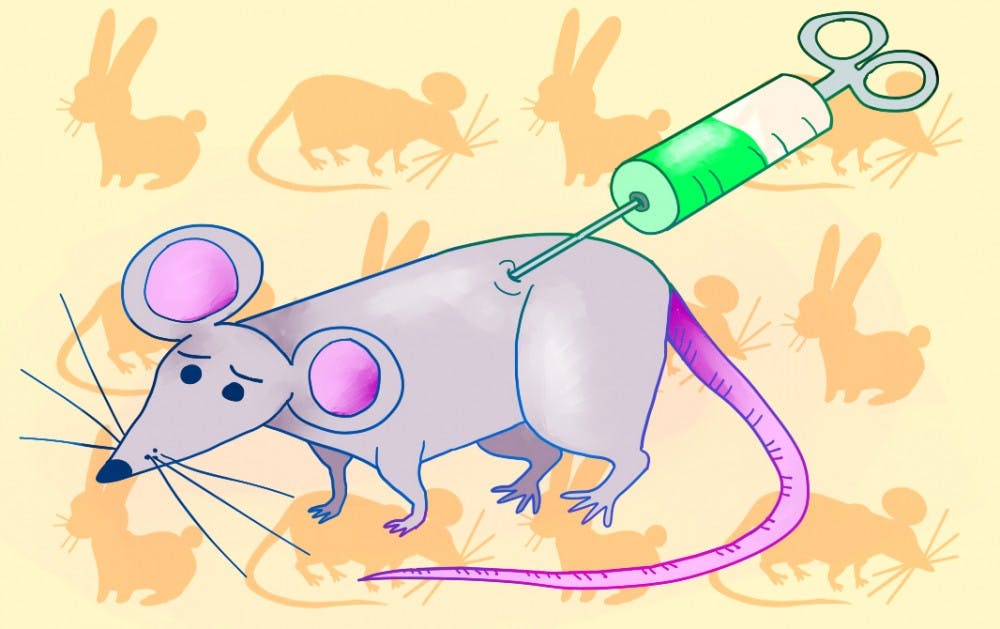ASU could face fines following a complaint that the university allegedly violated the Animal Welfare Act, which was filed by an animal rights advocacy group to the U.S. Department of Agriculture.
The group, Stop Animal Exploitation NOW!, also known as SAEN, filed a complaint in August after it obtained new documents that detailed several incidents, including a fight between two primates as well as a incident involving a rabbit chewing a soda can left in its cage.
The group filed the complaint after receiving documents through filing a public record request for internal ASU communications, including incident reports.
Documents provided by ASU and SAEN, including USDA agriculture inspection reports, showed that the incidents were promptly reported to federal governing bodies and investigated. As a result, ASU was cleared for those incidents at the time.
ASU said in an emailed statement that the University adheres to government regulations regarding animal safety, and that it always follows protocol to protect the animals being used for in vivo experimentation.
In vivo experimental methods encompass any experiment that is tested on a living thing.
A USDA official said in an email that they plan to inspect the facility again at some point in the future following the complaint.
“The oversight committee responsible for ensuring animal safety, care and welfare is the Institutional Animal Care and Use Committee,” an ASU spokesperson said in an emailed statement. “All faculty intending to use animals for research or teaching purposes must submit plans and gain approval from IACUC before performing their studies.”
This is not the first time that ASU has experience controversy over its use of animal test subjects. in 2009 ASU was criticized by People For the Ethical Treatment of Animals for its use of rabbits, frogs, mice and rats in biology labs and in early 2018 was cited for alleged inhuman treatment of a chinchilla.
But Michael Budkie, the co-founder and executive director of the animal advocacy group that made the complaint, said the remedies don't go far enough.
Budkie said he had two goals in filing the complaint.
“Obviously we believed that the general public has a right to know what's going on in laboratories since for the most part we are paying for them,” Budkie said. “And so we want the general public to find out about what goes on inside the Arizona State University laboratories. In addition to that, we believe that laboratories are governed by laws and when they break those laws they should be penalized. And so we're seeking the maximum penalty against Arizona State University.”
Budkie said that with modern science, in vivo testing is no longer needed to do novel and accurate scientific research. There are other computational, also known as in silico, methods that are more modern and humane approaches.
Budkie said that animal research was “old technology at best, and we believe that universities should switch to newer technologies such as organ-on-chip technology.”
Organ-on-chip technology is an in vitro, or in glass, method for mimicking the human body on a computer chip. This method allows researchers to run their tests on a non-sentient being.
But there are some in the scientific community who believe that in silico and in vitro methods are not as accurate as in vivo testing.
The director of the Center for Food Security and Public Health and the executive director of the Institute for International Cooperation in Animal Biologics, James Roth, said he is a supporter of in vivo testing in some situations.
"The people that say it's too complicated or that you can use computers or modeling, that does work for a few things, but there are situations where the only way to get answers is to use actual animals,” Roth said.
An ASU official touted research that supports the use of animal experimentation.
“In the U.S., the vast majority of the significant medical breakthroughs we experience today result from animal research studies that laid the vital groundwork before human clinical trials and FDA approval,” the spokesperson said. “Our faculty are pursuing research that could have a profound impact on the quality of life for people afflicted with devastating diseases like cancer, Alzheimer's and the world’s No. 1 killer, infectious diseases.”
The spokesperson went on to say, “many ASU innovations including an Ebola therapeutic, Zika vaccine research and cancer research studies simply would not have been possible without animal research testing.”
But there are others, such as Budkie, who believe the exact opposite.
“Animals are not human beings in little fur coats and their anatomy and physiology is different than ours,” Budkie said. “They react to drugs differently than we do."
The vice president of laboratory investigations cases at PETA, Alka Chandna, agreed with the notion that in vivo testing is no longer needed, citing the breakthrough technologies of organ-on-chip.
Chandna said the current status of medicine and medical discovery "is at the cellular level, at the molecular level and this is the level at which we are different from other animals," citing a National Institutes of Health analysis that showed mice are a poor substitute for humans when studying sepsis, an inflammatory disease.
And because of that, she said, animal model results from clinical trials are not relevant to humans. Chandna suggested the possibility of using supercomputer in silico methods as an alternative to animal testing.
According to Roth, this issue is not one of science, but ethics.
“Everybody's entitled to their opinion on the ethics ... and that's fine, but they shouldn't be using science to justify why there should be no animal research," Roth said. "If they firmly believe that ethically, then that's the position they're entitled to hold. But ... the ethics and the scientific aspects shouldn't get confused.”
Clarification: This story has been updated to clarify the condition of the rabbit involved in the complaint.
Reach the reporters at isaac.windes@asu.edu and nesherwo@asu.edu or follow @isaacdwindes and @thecolesherwood on Twitter.
Like The State Press on Facebook and follow @statepress on Twitter.




